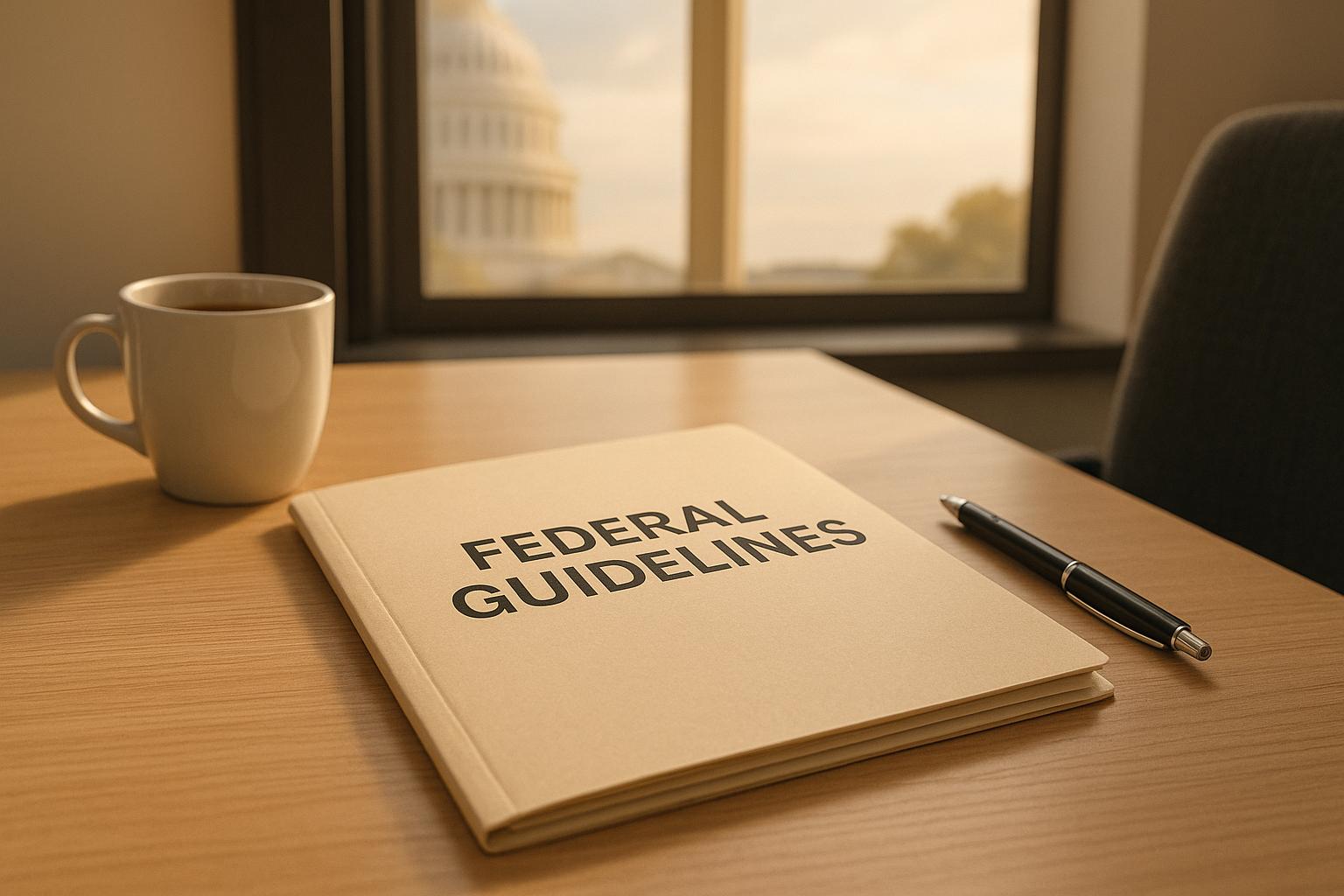
Federal Gift Rules: What Employees Need to Know
Federal Gift Rules: What Employees Need to Know
Federal employees must follow strict gift rules to protect public trust and ensure ethical government operations.
Here’s what you need to know:
- Gifts must be valued under $20 per occasion and cannot exceed $50 annually from one source.
- Cash and general-purpose gift cards are prohibited, but store-specific gift cards under $20 are allowed.
- Never accept gifts from anyone seeking official action or regulated by your agency.
- Employee-to-supervisor gifts are highly restricted, with exceptions for small, non-cash items under $10.
When in doubt, consult your agency’s ethics officials and document all gift-related decisions. Following these rules helps maintain government integrity and public confidence.
A Seasonal Look at Gifts from Outside Sources
Basic Gift Rules and Restrictions
Federal employees are expected to uphold ethical standards and maintain public trust by understanding and following the rules about accepting gifts. Here's a breakdown of what qualifies as a gift, who can give them, and the restrictions in place.
What Qualifies as a Gift
Federal regulations define gifts broadly, covering items like gratuities, favors, discounts, entertainment, hospitality, travel accommodations, meals, training services, loans, or forbearances that hold monetary value. However, some items are explicitly excluded from this definition, such as:
- Simple food items and non-alcoholic drinks
- Greeting cards and items with little to no monetary value
- Commercial discounts available to all government employees
- Benefits offered to the general public
- Items purchased at fair market value
- Items provided by the government
Who Cannot Give Gifts
There are strict rules about who federal employees can accept gifts from. Gifts should not be accepted from:
- Organizations seeking official action from the employee's agency
- Companies regulated by the agency
- Entities with interests that could be influenced by the employee's responsibilities
- Groups primarily made up of the above sources
These restrictions are in place to prevent any undue influence or conflicts of interest. Even if an exception applies, employees are required to decline gifts that could create the appearance of bias or favoritism.
When Gifts Are Permissible
There are specific scenarios where accepting gifts is allowed, provided the conditions meet established criteria. Here's a quick reference:
| Gift Category | Criteria | Value Limit |
|---|---|---|
| Single Occasion Gifts | Must be unsolicited | $20 or less |
| Annual Gifts per Source | Total combined value from one source | $50 maximum |
| Personal Friendship Gifts | Based on a genuine personal relationship* | No specific limit |
| Widely Attended Events | Free attendance from event sponsor; agency approval may be required | N/A |
*Employees should document the nature of the personal relationship when accepting friendship-based gifts.
For example, a $15 store gift card from an agency contractor would generally be acceptable. However, a similar card from a credit card company, which is akin to cash, would not be allowed.
If employees are unsure about a gift, they should:
- Evaluate its value, the source, and whether any exceptions apply
- Consult with ethics officials for guidance
- Keep records of their decisions for transparency and accountability
Gift Value Limits: The $20 Rule
Federal employees must follow strict monetary limits to maintain compliance and uphold ethical standards.
Single and Annual Gift Limits
Federal employees can accept unsolicited gifts valued at $20 or less per occasion, but the total value of gifts from a single source cannot exceed $50 in a calendar year. Here’s how these limits work in practice:
- Employees cannot pay the difference to accept gifts priced over $20.
- If multiple items together exceed $20, they must decline one or more items to stay within the limit.
- The market value of a gift is based on its current worth, not the price the donor originally paid.
Banned Gift Types
Certain types of gifts are outright prohibited, while others are allowed under specific conditions:
| Gift Type | Status | Reason |
|---|---|---|
| Cash | Prohibited | Never acceptable under any circumstances |
| General-purpose gift cards | Prohibited | Treated as equivalent to cash |
| Investment interests | Prohibited | Includes stocks, bonds, or certificates of deposit |
| Store-specific gift cards | Allowed* | Permitted if each card is worth $20 or less and redeemable only at specific retailers |
*Store-specific gift cards must be limited to designated locations or affiliated stores.
Example: Holiday Gift Rules
These rules are particularly relevant during seasonal gift-giving events, like holiday parties.
"The key is that you should not give your supervisor a holiday gift with a market value over $10. Likewise, if you are a federal employee, you should not accept a gift from a coworker with a market value of over $20... And you have to make sure that the aggregate total value of the gifts you receive from any single source does not exceed $50 a year." - John Mahoney, chairman of the Labor and Employment Practice Group at Tully Rinckey
For instance, if a contractor gives an employee a $15 store gift card at a holiday party, it’s acceptable. However, if additional gifts from the same contractor push the total value over $50 for the year, the employee must decline further gifts to remain compliant.
sbb-itb-309de5c
Employee-to-Employee Gift Rules
Federal employees are required to adhere to strict guidelines when exchanging gifts with colleagues. These rules aim to uphold professionalism and avoid any potential conflicts of interest.
Gifts to Supervisors
Federal employees are generally prohibited from giving gifts to their supervisors, with a few specific exceptions outlined below. These rules apply to both individual and group gifts.
| Occasion | Gift Limit | Additional Guidelines |
|---|---|---|
| Regular occasions (e.g., birthdays, holidays) | $10 or less | Only non-cash items are allowed. |
| Special occasions (e.g., marriage, new child) | Minimal value | The gift must be appropriate to the occasion. |
| Retirement/Transfer | Minimal value | Group contributions are permitted. |
| Shared office refreshments | Reasonable value | Refreshments must be shared among staff. |
| Personal hospitality | Customary value | Must occur at the employee’s residence. |
These exceptions ensure that gifts remain modest and appropriate, avoiding any perception of favoritism or undue influence.
Office Collection Rules
When organizing group gifts for special occasions, employees must follow clear guidelines to ensure compliance with federal regulations.
Permitted Practices:
- Contributions must be entirely voluntary, with no obligation to give any amount.
- For retirement or transfer gifts, suggested contributions may be announced, but participation remains optional.
Prohibited Practices:
- Employees cannot pressure or solicit contributions from colleagues, contractors, or subordinates.
- Collecting funds for recurring events like birthdays or holidays is not allowed.
- Subordinates may not be asked to contribute toward gifts for supervisors.
"An employee may not give, or solicit a contribution for, a gift to an official superior, and a superior may not accept a gift from an employee receiving less pay than him or her if the employee is a subordinate." - Justice Management Division
For gifts exchanged between employees of equal rank, it’s essential to evaluate any risks of perceived conflicts. When in doubt, employees should consult their ethics officials to ensure compliance.
How to Follow Gift Rules
To ensure compliance and maintain agency integrity, it's crucial to evaluate, track, and report gifts properly. Here's how you can do it.
Gift Acceptance Checklist
Before accepting any gift, federal employees should follow this evaluation process. Proper documentation is essential:
| Step | Action | Key Consideration |
|---|---|---|
| 1. Source Check | Verify the source is allowed | Be cautious of contractors, regulated entities, or individuals seeking official action |
| 2. Value Assessment | Confirm the gift’s fair market value | Typically, the value should be under $20 per gift |
| 3. Type Verification | Ensure the gift type is acceptable | Note that cash and financial institution gift cards are prohibited |
| 4. Appearance Test | Assess public perception | Consider if the gift could raise questions about impartiality |
Required Records and Reports
Federal employees are required to keep detailed records for specific gifts:
- Gifts valued at $192 or more
- Combined gifts totaling more than $480 from a single source in a calendar year
- Travel reimbursements exceeding $480 from one source
For travel-related gifts, document the full itinerary (including dates), expense breakdown, source details, and the gift's value. Digital tools can make this process more efficient.
Digital Gift Management
Using digital tools can help simplify the demanding recordkeeping process. A well-organized tracking system should include:
- A description of the gift and its estimated value
- The date it was received
- Information about the source
- Its final disposition (e.g., accepted, returned, or reimbursed)
Platforms like GiftList offer digital solutions to help:
- Track gift values accurately
- Maintain compliant and organized records
- Simplify the documentation process for received gifts
Conclusion
Adhering to federal gift rules is essential for safeguarding public trust and maintaining the integrity of government operations. As Thomas Jefferson once said, "When a man assumes a public trust, he should consider himself as public property."
These rules remind federal employees to place their loyalty to the Constitution and the law above any personal interests. This principle forms the foundation for all decisions about accepting gifts, as discussed earlier.
"The underlying reason for gift restrictions is the fundamental obligation of federal employees to place loyalty to the constitution, laws and ethical principles above private gain in order to earn and retain the public's trust." - Larry Wilde, Attorney at Army Materiel Command
Ignoring these regulations can damage the government's reputation and erode public confidence. By keeping thorough records, understanding value limits, and following proper procedures, employees show their dedication to ethical service and help ensure the integrity of government work for years to come.
To stay compliant, consider these key steps:
- Keep up-to-date on current gift rules and limits
- Seek guidance from ethics officials when in doubt
- Document all gifts received in detail
- Assess how accepting a gift might be perceived by the public
- Always prioritize ethical standards over personal gain
These practices foster a workplace culture built on integrity, reinforcing the core values of public service and protecting both employees and the institutions they represent.
FAQs
What should federal employees do if they receive a gift worth more than $20?
Federal employees are prohibited from accepting gifts worth more than $20 on a single occasion. If you're offered a gift that exceeds this limit, the proper course of action is to politely decline. It's important to note that paying the difference to keep the gift is not allowed. If you're unsure how to proceed, reach out to your supervisor or your agency's ethics official for advice. Adhering to federal gift rules is crucial to maintaining ethical standards and avoiding any potential conflicts of interest.
Can federal employees accept gifts from personal friends, and what are the rules?
Federal employees can accept gifts from personal friends as long as the gift stems from a true personal relationship and has no connection to their official duties. However, there are limits: the gift’s value must not exceed $20 per occasion or $50 in total annually from the same source. For gifts exceeding these thresholds, employees should thoroughly review federal regulations to ensure they stay within the rules.
It’s also important to note that gifts should never be accepted if they are given because of the employee’s government position, even if the giver is a personal friend. When in doubt, prioritize openness and seek guidance from your agency’s ethics office.
What happens if a federal employee breaks the rules on accepting gifts?
Federal employees who break the rules on accepting gifts can face serious consequences. These repercussions might include disciplinary measures like suspension or even losing their job. On top of that, criminal penalties - such as hefty fines or jail time - could also come into play. In certain situations, employees may even be required to return the gift or pay back its market value.
Understanding and following these rules isn’t optional - it’s essential for avoiding legal trouble and protecting one’s career.


